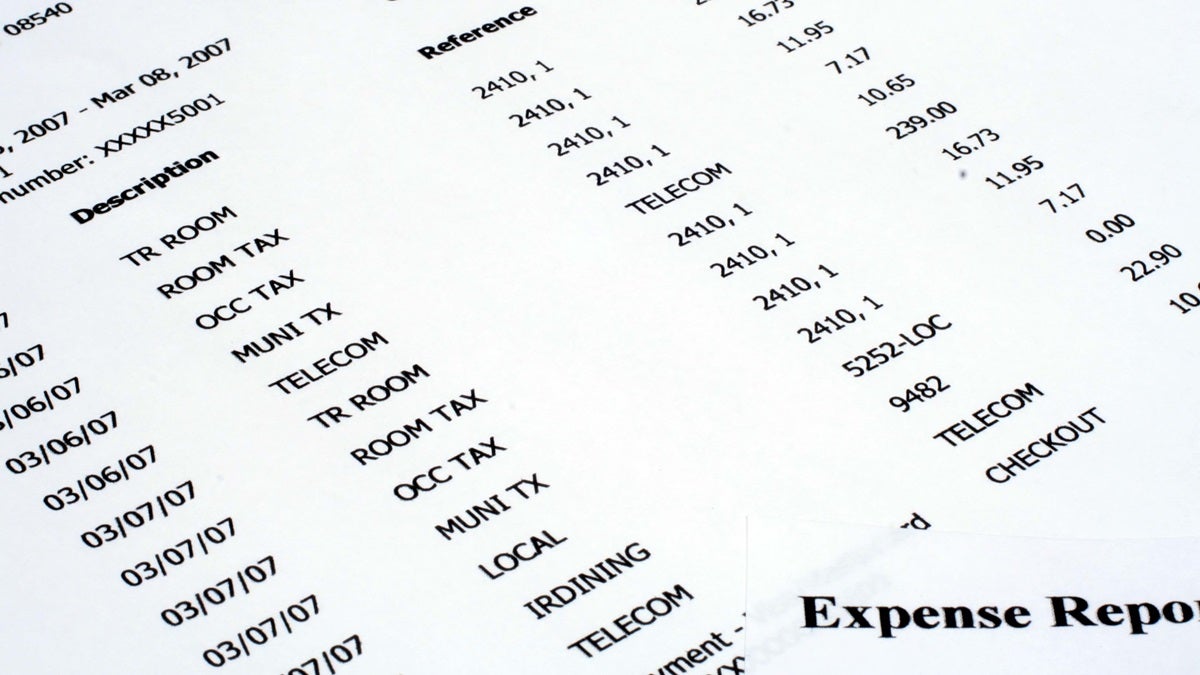Del. travel policy described as “confusing”
Listen Expense report photo via ShutterStock) " title="expense-report-169" width="1" height="1"/>
Expense report photo via ShutterStock) " title="expense-report-169" width="1" height="1"/>
(Expense report photo via ShutterStock)
Allegations of Delaware State Treasurer Chip Flowers abusing his state-issued credit card prompted an independent review of the state’s travel policies.
In an effort to provide context, Delaware State Auditor Tom Wagner’s inspection looked not only into the treasurer’s and deputy treasurer’s travel activities, but also delved into the activity of state officials like Gov. Jack Markell and Transportation Secretary Shailen Bhatt.
Wagner released the results of his report Wednesday morning. Aside from exonerating Flowers of any misconduct on his part, the report found flaws with the state’s travel and Procurement Card (PCard) policies.
“The real issue is the state’s travel policy is very bureaucratic and I think really becomes at the heart of the issue that you could have a much more clearer, concise travel policy,” said Wagner, who is the only Republican elected to a statewide office. “I think that the travel policy gets changed quite frequently so therefore it becomes a moving target.”
It’s so confusing, Wagner went on to say even the Office of Management and Budget’s own staff, which processes the governor’s travel and PCard transactions, was often found to be in non-compliance.
For example, the majority of state officials, the governor included, failed to fill out what’s called an out-of-state travel authorization form ahead of any out-of-state trips. The form asks who’s traveling, where the event is and for a cost estimate.
“A lot of agencies don’t use that form. It’s mandated, but in a lot of cases the agencies probably aren’t really aware that they need to use that form,” Wagner said.
Making things even more confusing, Wagner said, are the per diem limits on charges for things like food and hotels, rules for when to use your state credit card and what types of receipts and other forms of backup documentation is required for reimbursement.
“Sometimes traveling, those just become very impractical and you’re really spending tons of administration time literally tracking down pennies,” Wagner said.
The state auditor said he fully understands that travel is necessary for government officials, but that Delaware needs to develop a clear travel policy that demonstrates the need for the trip and the expenses associated with it with the least amount of red tape.
“What a lot of people forget in government, when you’re having a lot of internal oversight, you’re driving up your administrative costs and they’re producing, relatively speaking, very little value to the taxpayers or delivering services. It’s that classic bureaucratic shuffling of paper,” he said.
Wagner suggested setting a cap for hotel rooms in a given region based on federal government travel standards and that a clear procedure be put into place should a stay vary from that.
State elected officials do have caps on how much can be spent for meals and other miscellaneous items, but Wagner said administrative time and money is wasted looking into whether agencies followed the rules.
“You can have a travel policy that’s complete, protects the taxpayers, yet is still fairly open allowing discretion at agency levels,” he said.
WHYY is your source for fact-based, in-depth journalism and information. As a nonprofit organization, we rely on financial support from readers like you. Please give today.





